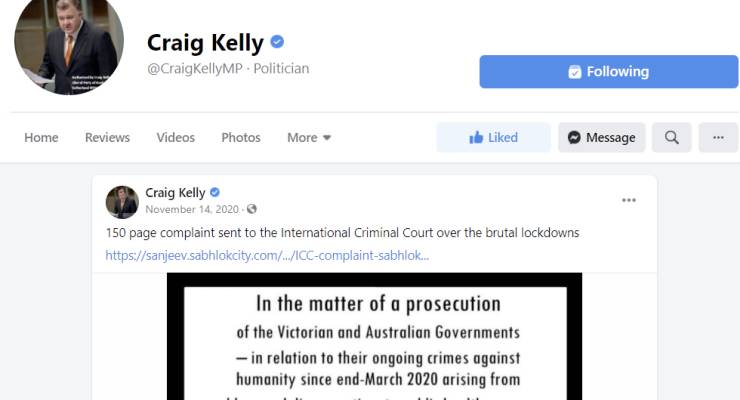
Yesterday, the Member for Hughes, Craig Kelly, suffered a great tragedy.
A man so addicted to sharing misinformation and crank conspiracy theories on social media that he abandoned his political party had his one true love — his Facebook account — taken from him.
On Monday afternoon, Facebook removed Kelly’s page, arbitrarily deciding that one of his latest posts had crossed the line and warranted removal under the company’s policies against COVID-19 misinformation.
Prior to this, Facebook had removed Kelly’s posts, given him verbal warnings and even temporarily banned his account for his misguided and incorrect ramblings against vaccines, COVID-19 public health measures, and action on climate change.
Kelly predictably lashed out at the private company, calling its decision to remove him censorship in text messages published by the ABC, Australia’s most read news source.
“This was the most popular, highly used political Facebook page in the country,” he said.
A misinformation superspreader
Kelly’s not quite right about the scale of his Facebook reach, but he’s not far off either.
His Facebook page consistently ranked among the top performing Facebook accounts for all Australian politicians.
Queensland University of Technology senior lecturer and social media researcher Tim Graham noted in January that Kelly’s posts had received 5 million interactions (i.e. likes, reactions, shares and comments) in the past year.
That included 35 posts about hydroxychloroquine, a drug championed by Kelly as a COVID-19 treatment but rejected by the mainstream scientific community as useless.
Kelly himself offered some rare insight into just how far his reach was. In an Instagram post on April 14, Kelly shared a screenshot of his Facebook internal dashboard that showed he’d had more than 1.1 million engagements on his posts from 640,000 users in the past four weeks.
His social media reach during the pandemic went further than the social media accounts of the Australian government, Department of Health, Health Minister Greg Hunt and even Prime Minister Scott Morrison.
More than that, Kelly acted as a gateway between fringe groups and mainstream media. He would take positions from anti-vaxxer and anti-lockdown groups like Reignite Democracy Australia and spread them on traditional media.
A recent example of this is his crusade against vaccine passports. Kelly adopted a softer version of anti-vaccine rhetoric by taking issue with placing restrictions on those who choose not to be vaccinated — something that’s already done in Australia (with our No Jab No Pay/Play legislation) and around the world.
After Kelly posted about it repeatedly, he was invited on Sky News to talk with Alan Jones about the same topic. This interview was distributed widely, including by anti-vaxxer groups (thus completing the human centipede of vaccine misinformation and dog whistling).
Kelly has long used his office and his incredibly large platform to undermine trust in Australia’s institutions and science in spite of the best available evidence.
Will Kelly be in the next Parliament?
Kelly’s political career is all but over.
After leaving the Liberal Party, his only hope was to post through it: use his enormous online reach to somehow convince his electorate that he was the right person to represent it as an independent.
It was set to be an interesting test: can someone with fringe views find enough support to win a House of Representatives seat without the backing of a major party? After all, it’s unlike the Senate where you only need a small percentage of a larger number of people.
But without his main weapon, Kelly’s near-zero chance at winning reelection has been extinguished.
Even with Twitter, Instagram, his backup Facebook page (which will likely be banned too) and the conspiracy theorist’s platform of choice Telegram, Kelly will struggle to reach the sheer numbers of people he was reaching on Facebook.
RIP Craig Kelly’s Facebook page, a source of bullshit that was taken far too late.








Kelly should join the Pentecostalist Churches, and become Brother Craig. How would Morrison deal with him then, I wonder.
Perhaps one of the Crikey journos could do research into just what conspiracy theories Facebook, or any other sites for that matter, have cancelled. What have they done about Qanon or Ltd News miss-information for example.
So Craig Kelly disappears from the political scene with his parliamentary annual pension of over 50% of his current salary ($211,250pa) each year until he dies and then his spouse gets 65%+ of it each year until she dies. He also get a ‘redundancy’ one off payment of half his salary when he is not elected in the next election ($105,625).
He spent most of his years in Parliament in Manila as a ‘threat to national security’ and was re-elected with an increased majority last election.
What did the voters know and what were they thinking?
The Member for Manila is that other ornament to the Parliament, George Christensen.
Still not bad for a furniture salesman.
Sorry Craig. I meant to read some of that crap that you blather on about. Just never found the time. Looks like I missed out. My loss.
Ok.
Kelly’s backup Facebook page has gone now too. It took a few days.